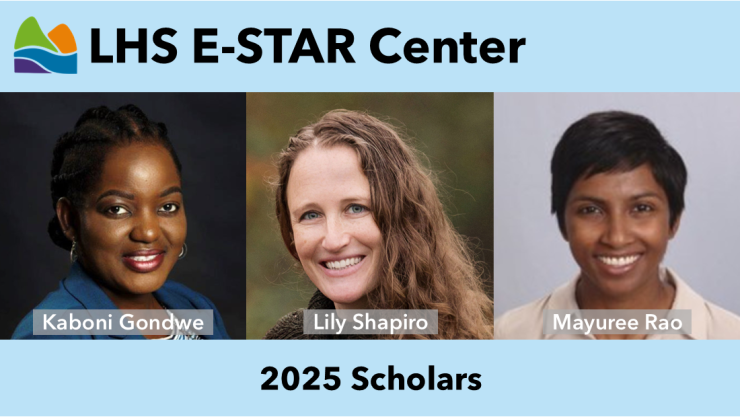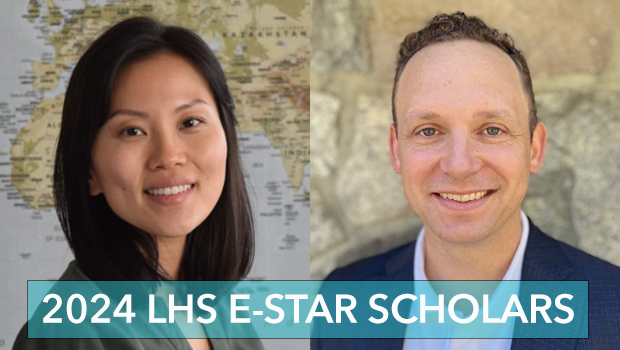LHS E-STAR training program selects 3 new scholars

Trainees will lead learning health system research at Kaiser Permanente Washington and VA Puget Sound Health Care
By Sunday Brush, research coordinator for the Center for Accelerating Care Transformation (ACT Center) and the Washington Learning Health System Embedded Scientist Training and Research (LHS E-STAR) Center
The Washington Learning Health System Embedded Scientist Training and Research (LHS E-STAR) Center is excited to announce 3 new scholars: Kaboni Gondwe, PhD, RN; Lily Shapiro, PhD; and Mayuree Rao, MD, MS. These scholars will partner with leaders from Kaiser Permanente Washington and Veterans Affairs (VA) Puget Sound Health Care System to conduct research aimed at transforming primary care.
The LHS E-STAR Center trains early-career scientists to design and conduct learning health systems (LHS) research in partnership with real-world primary care organizations. Scholars learn LHS research methods by leading projects alongside primary care partners who select high-priority improvement areas for scholars to explore. This work is funded by the Agency for Healthcare Research and Quality and the Patient Centered Outcomes Research Institute.
“The E-STAR Center is thrilled to welcome Kaboni, Lily, and Mayuree and to support their training in learning health system research,” said Paula Lozano, MD, MPH, who co-leads the center with James Ralston, MD, MPH. “Each of them will leverage their considerable skills and experience in projects that align with our mission of transforming primary care. We are excited to see the impact of their work.”
Kaboni Gondwe: Championing maternal and child health
Gondwe is an assistant professor at the University of Washington (UW) School of Nursing. With a doctorate degree in nursing from Duke University and a Master of Science degree in nursing administration and education from Ohio University, she has dedicated her career to improving maternal and child health outcomes. Her journey began in Malawi, where she worked as a nurse-midwife, gaining firsthand experience with the challenges faced by pregnant women in underserved communities. Her research has focused on health equity, maternal mental health, and perinatal stress, with a particular emphasis on marginalized populations.
E-STAR project with Kaiser Permanente Washington: Gondwe's E-STAR project aims to address low rates of postnatal care attendance among Black and Indigenous people who have recently given birth. Her research will explore the barriers and facilitators to postnatal care, with the goal of developing interventions that improve access and outcomes for these communities. She will gather both quantitative and qualitative data to inform her interventions, ultimately aiming to reduce maternal mortality and morbidity.
Lily Shapiro: Enhancing pediatric vaccination rates
Shapiro is a collaborative scientist at Kaiser Permanente Washington Health Research Institute (KPWHRI). She holds a doctorate degree in sociocultural anthropology and a Master of Public Health degree in health services from UW. Her career has been marked by a commitment to understanding how people interact with health care systems and addressing health disparities. Her research spans global occupational health, dementia care, and now — with E-STAR — pediatric health services.
E-STAR project with Kaiser Permanente Washington: Shapiro will focus on improving influenza vaccination rates among children under 2 years old at Kaiser Permanente Washington. By conducting a comprehensive review of existing vaccination strategies and engaging in qualitative research with parents and clinic staff, she aims to identify barriers and develop tailored interventions to increase vaccination rates. Her work will contribute to reducing health disparities and improving pediatric health outcomes.
Mayuree Rao: Addressing Veterans' health-related social needs
Rao is an acting assistant professor in General Internal Medicine at the UW School of Medicine and a primary care physician at the VA Puget Sound Health Care System. She completed her medical training at the Warren Alpert Medical School of Brown University and received a Master of Science degree in health systems and population health from UW. Her research has focused on peer support for chronic disease self-management and health-related social needs among Veterans.
E-STAR project with VA Puget Sound Health Care System: Rao's project focuses on the health-related social needs (HRSN) of Veterans who live in rural areas. By adapting the VA's Assessing Circumstances and Offering Resources for Needs (ACORN) initiative for a rural community-based setting, she will conduct a pilot study to identify and address the unique HRSN of rural Veterans. She will collaborate with the Veterans Memorial Museum in Chehalis, Washington, a community hub where local Veterans seek a range of social services and connections.
We look forward to seeing the impact that our new E-STAR scholars will have through the research they lead and the partnerships they develop. Their projects exemplify the mission of the E-STAR program to foster the next generation of health system scientists and leaders while conducting research to improve health outcomes.
These 3 scholars join our 2 inaugural E-STAR scholars, who entered the program in 2024. This fall, the E-STAR program will announce a call for letters of interest for the third cohort of scholars who will partner with HealthPoint and the Community Health Association of Spokane (CHAS Health). For more information about this opportunity, please reach out to LHS-ESTAR@kp.org or visit the Washington LHS E-STAR website.
LHS E-STAR is led by KPWHRI and UW. Mentors from both organizations help guide the scholars throughout their tenure, and the Center for Accelerating Care Transformation (ACT Center) supports
E-STAR projects by providing LHS research expertise. Learn more on the LHS E-STAR website.


